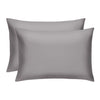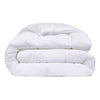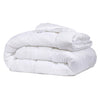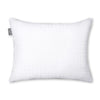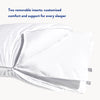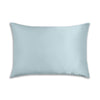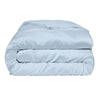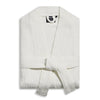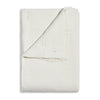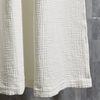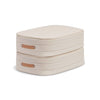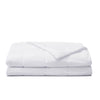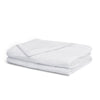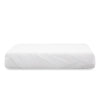The Daily Miracle
How Long Do Sheets Last?
Published
January 21, 2023
Author
Bridget Reed

Is it time to say goodbye to your favorite pair of sheets?
According to experts, if you have been using them consistently, you should replace your sheets every two to three years. There are quite a few reasons for this, and most of them have to do with cleanliness.
However, there is also a mental benefit to keeping your sheets fresh. Studies show that 75 percent of people sleep better on newer, cleaner sheets as opposed to older sets.
Of course, there are exceptions to this general rule. If your sheets are still in good shape after the recommended time frame, there’s no reason to get rid of them.
However, if you’re asking the question, there’s a good chance it might be time to invest in a new set of sheets. We’ll help you determine if you really need to replace your sheets, how you can help them last longer, and explain why clean, new sheets are necessary.
When Do You Need To Replace Your Sheets?
While it’s a good general rule to replace your sheets every two to three years, sometimes you may need to retire your sheets a little sooner.
Here are a few signs that you should replace your sheets with a new set:
- Obvious wear and tear. If your sheets have holes in them, are thinning, or have excessive stains, it may be time for new ones.
- Discoloration or yellowing. While these are technically cosmetic issues that could be overlooked, having fresh, clean sheets can help you sleep better.
- Discomfort. If your sheets just don’t feel comfortable anymore, it’s definitely time to invest in a new set.
How Can You Extend the Life of Your Sheets?
Once you’ve decided to invest in a brand new set of sheets, you’re probably wondering if there is anything you can do to make them last longer. After all, buying a new set of high-quality sheets may feel like a significant purchase. Thankfully, we have a few tips to help you extend the life of your sheets.
1. Cycle Between Different Sets
This simple solution can help you avoid quick wear and tear on your sheets. Instead of washing and using the same set of sheets repeatedly, swap your sheets out regularly to give each set a break.
So, how many sheet sets should you own? There is no perfect number, but two to three sets are enough to give each set a few extra years of life.
2. Store Your Sheets Properly
As you cycle through your sheets, you’ll need somewhere nice to store the sets that are resting.
While not everyone has access to a full linen closet, there’s a reason many homes and apartments come equipped with one. The way you store your sheets can impact their life span in a way that you may not even realize.
To store your sheets properly, follow these simple steps:
- Find a dark, dry space (similar to a linen closet).
- Invest in a fabric bag or other fabric-friendly container. Avoid plastic, cardboard, and cedar, as these may lead to yellowing.
- Don’t overcrowd the storage space.
- Add something (like a scented drawer liner, sachet, or freshness sheet) to keep them smelling nice.
Instead of shoving them in a drawer or plastic bin under your bed, following these tips can keep your sheets fresh and crisp for even longer.
3. Invest in High-Quality Sheets
While you don’t need to rush out and buy the most expensive set of sheets with the highest thread count, investing in a high-quality sheet set will definitely go a long way. So, what should you look for in a good set of sheets?
Here are a few things to consider when finding comfortable, quality sheets:
- What type of fabric are they made of? There are quite a few different types of sheets, from Egyptian cotton to bamboo to silk. Some fabrics naturally last longer than others.
- What is the thread count? While thread count does not directly correlate to long-lasting quality, it can help. Higher thread counts can wear differently over time, sometimes making the sheets softer with use.
- What is the weave type? The most common weaves are sateen and percale. It’s worth a few minutes to learn the difference and what that means for your sheet quality and feel.
Ultimately, the best set of sheets is the one you enjoy using the most. Just keep in mind that this may lead to you replacing your sheets more often.
4. Follow the Wash Instructions
Did you know that the little symbols on your sheet tags actually mean something important?
It can be tempting to throw your sheets in the washer, push a few buttons, and go on your way without paying much attention to howyour sheets should be washed.
However, doing this could take months or even years off the life of your sheets. When you ignore the washing instructions, you run the risk of shrinking your sheets, using the wrong temperature, or not cleaning them well enough.
If you’re not sure what the wash instructions are telling you to do with your sheets, check out this handy guide for the breakdown of each symbol. This is useful knowledge to keep handy for everything you plan to put in the wash — not just your sheets.
How Often Should You Wash Your Sheets?
In general, you should wash your sheets at least once a week.
Why should you wash your sheets so often? As gross as this sounds, your bed harbors bacteria, dust, and other not-so-nice things. Washing your sheets help keeps these things off your skin and out of your body.
If you let your pet lounge in bed with you, you have an extra reason to keep your sheets washed. As lovable as our furry friends can be, their hair and skin can host germs and bacteria that you don’t want living on your sheets.
For those with asthma or other breathing conditions, washing your sheets can help eliminate dust mites and allow you to sleep and breathe better. If you have sensitive skin or are prone to breakouts, your sheets could be collecting oil and dirt and irritating your skin. In this case, regularly washing your sheets may help tame the breakouts.
If washing once a week seems like too much, you can invest in a nice set of sheets that are specifically designed to stay clean for longer so you can wash them less often.
Sleep on Fresh, Clean Sheets
Now that you know how long sheets last, it might be time to invest in a new set. Remember to do some research, set up a nice storage system, cycle between two or three different sets, and wash your sheets regularly. If you follow these tips, you just may be able to squeeze a few more years out of your sheets!
Sources:
The Powerful Psychology Behind Cleanliness | Psychology Today
How Often Should You Wash Your Sheets in Summer | Cleveland Clinic
A Visual Guide to Learning What Laundry Care Symbols Mean | Insider


